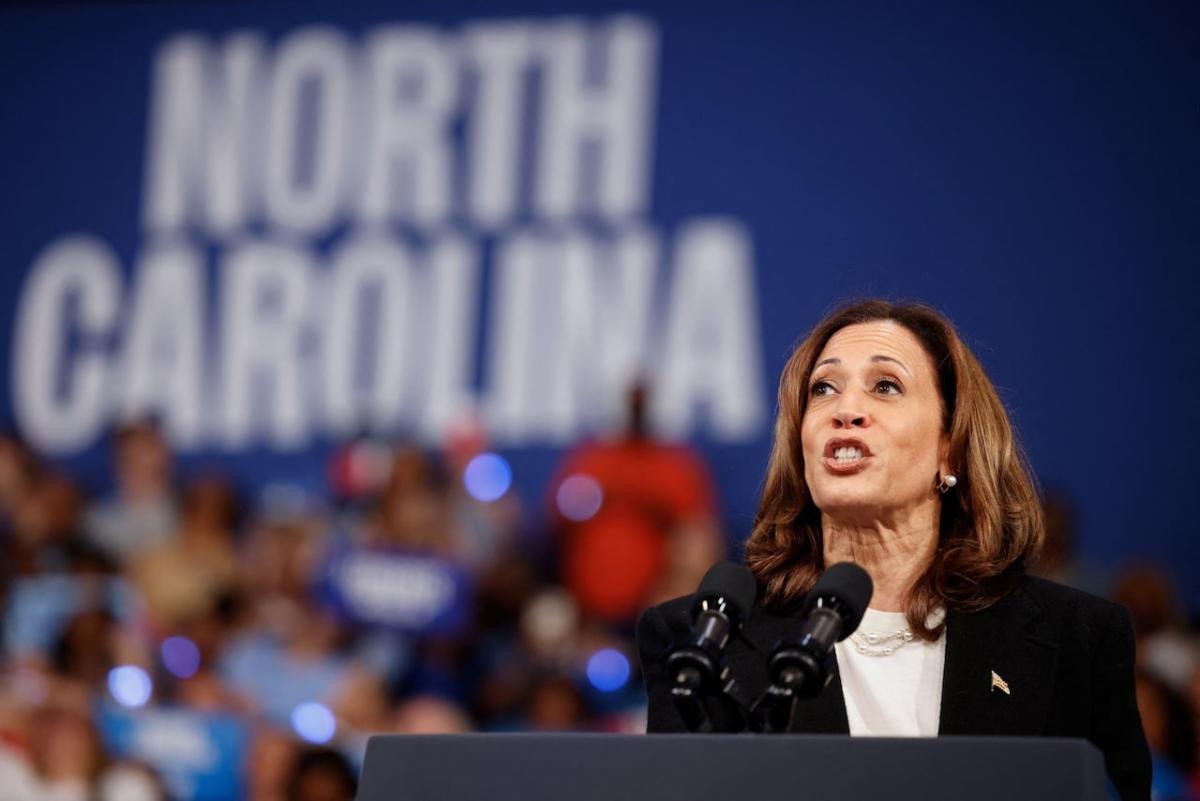The reason Kamala Harris keeps visiting North Carolina is made evident in an eye-popping pattern her campaign volunteers have noticed while knocking on doors.
What they see are signs of a state growing so rapidly that Asheville’s airport is a giant construction site and almost six per cent of the city’s residents have moved here from another state in just one year.
Campaign volunteer Susan Thomas only got here two months ago, and she’s already canvassing on behalf of the Democratic presidential candidate.
She hears a familiar story: one person, after another, after another, tells her they’ve just moved from somewhere else.
In the span of just a few minutes last Sunday, Thomas encountered South Carolina Democrats who moved here this year for cooler weather and bluer politics, beside another family of South Carolina Democrats who just moved in next door. She then came across a block party hosted by recently arrived California Democrats, where a Democrat from New Orleans was standing beside the host.
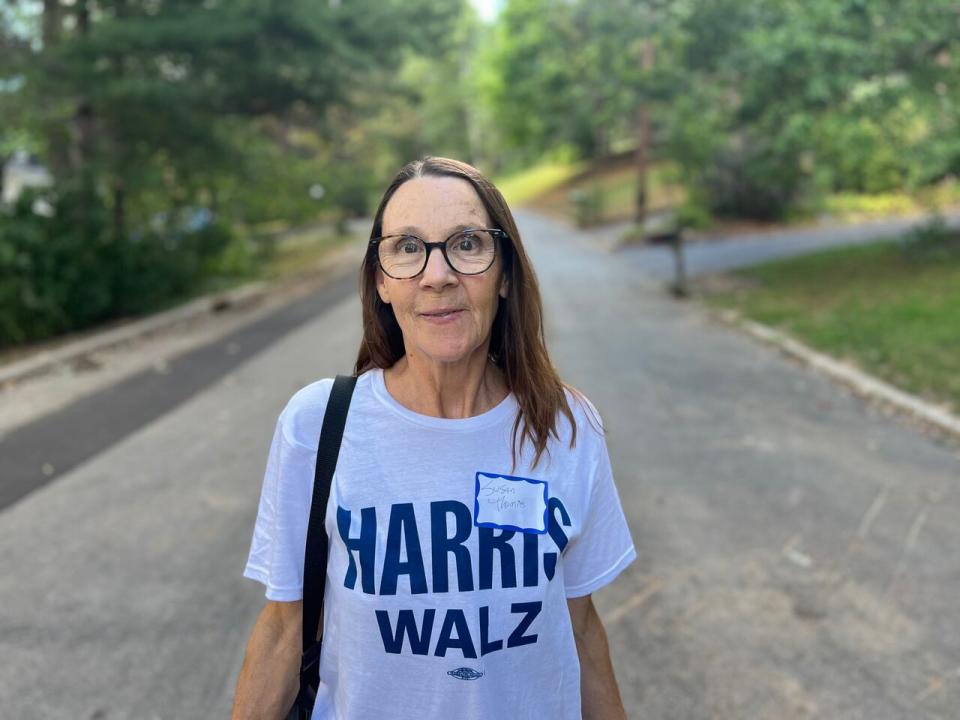
Susan Thomas moved from Texas to North Carolina this summer. She’s now volunteering for Democrats in her new state. (Alex Panetta/CBC)
The man from New Orleans said that when he moved here two years ago, a neighbour saw his Louisiana plates and grumbled. This isn’t Trump country.
“I [replied], ‘Don’t worry, we are not Trumpers,'” said Scott Purinton, a retired geologist who came for better weather and fewer hurricanes.
Thomas herself left Texas for the cooler climate, lower living costs and an added political bonus: the chance to vote in a swing state.
“Our vote wasn’t mattering [in Texas],” said Thomas, a foster-care worker who started volunteering, in part, to meet people in her new city.
It could matter a lot here this year. North Carolina is a coin-toss state in a coin-toss election, and if that coin lands on the blue side, Harris could roll to victory, with an expanded path to an electoral college win that may not require Pennsylvania or Arizona.
Bustling state, big changes
This bustling state is attracting college-educated workers, wealthy retirees and Latino and South Asian immigrants as it diversifies; the non-white population share is 10 percentage points higher than in 2000.
This explains why a state that once voted Republican by a dozen points now consistently has photo-finish elections, with Republicans usually ahead by a whisker.
It’s close again.
“A bit of a crap shoot,” is how the Democrats’ chair in Buncombe County, Kathie Kline, describes this year’s race.
Harris’s entry has changed it. She’s now statistically tied, even ahead, in most polls amid a shift in enthusiasm since she replaced Joe Biden atop the ticket.
The president, Kline concedes, was not going to win this state. Morale had plunged after his June debate performance.
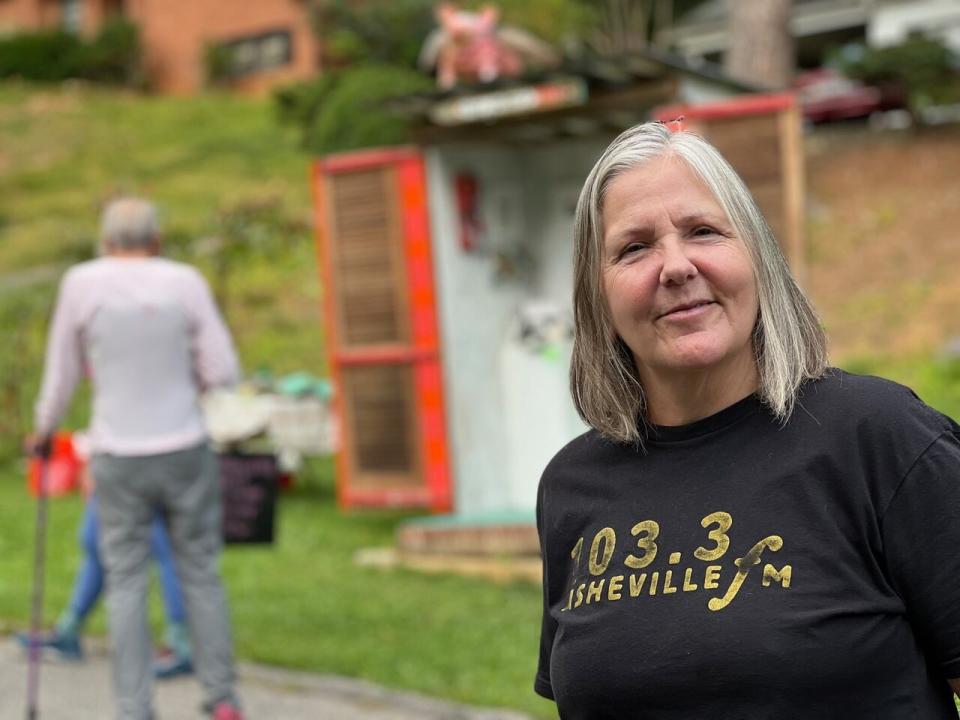

Janet Tubbs hosts an art exhibit on her lawn in Asheville, N.C. Now semi-retired, she moved here three years ago from California, where she worked for the department of transportation. She and her husband wanted a place closer to relatives out east, and they chose this state for its nature — and because it was a swing state. (Alex Panetta/CBC)
Kline was getting about 20 calls a week from people asking to volunteer. That jumped to 144 the week Biden dropped out and it’s stayed high ever since, Kline said.
“It’s electric,” is how her husband, Robert, describes the change. He’s a retired doctor who still volunteers once a week as a physician. “There’s just a whole new spirit.”
The couple moved from Oregon four decades ago. In those days, Kathie was a student teacher in Buncombe County and recalls urging a boy to stop repeatedly using the N-word. This earned her a reprimand. Her supervisor, the county’s teacher of the year, pulled her aside and scolded her for insulting the boy’s heritage. “She told me I was in the wrong.” Kline said.
The pace of change here is mind-boggling, says Rob Christensen, a longtime political columnist in North Carolina.
Now retired, Christensen lives in a boomtown outside the capital, Raleigh, called Cary. The locals joke that the name stands for “Containment Area for Retired Yankees.” Half the population in next-door Morrisville is Indian American and it’s become a cricket hotbed.
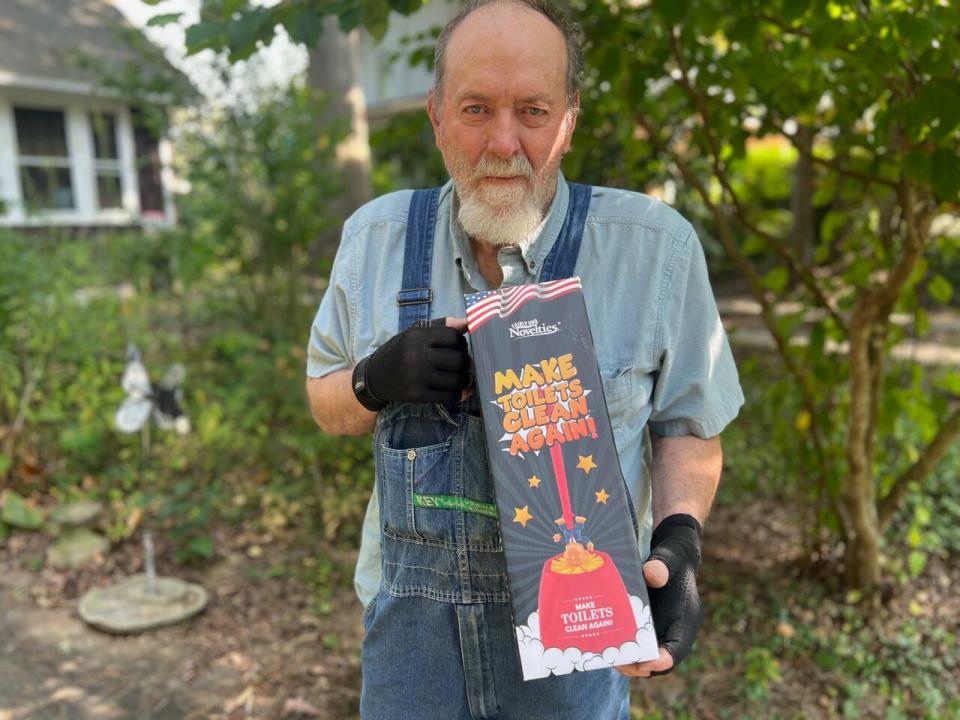

Glen Davis, a plumber from Asheville, refers to Trump as the ‘Orange Satan.’ Here, he shows off his Trump toilet scrubber. (Alex Panetta/CBC)
Advantage: Trump
Democrats have another thing working for them this year, says Christensen: Republicans have nominated extremists down the ballot, for governor and in local races, including a candidate who called for public executions of Barack Obama and Joe Biden. This risks turning off moderates, whom he’s described in his own writing as Starbucks-Whole Foods Republicans.
So who’s going to win?
“If forced at gunpoint to put my money on one candidate or the other, I would put it on Trump,” Christensen said. “But I wouldn’t do it with a lot of confidence.”
Trump’s strength becomes obvious outside city limits. In a bustling roadside barbecue joint in Rutherford County, CBC News interviewed a half-dozen patrons. All six support Trump.


Victory seemed assured in North Carolina for Donald Trump until Joe Biden left the race. Now he’s forced to play defence, with stops here like the one seen above in Asheboro last month. (Jonathan Drake/Reuters)
Trump took almost three-quarters of the vote in this county in the last election. His political success rests on running up the score in thousands of small places just like this, with far higher rural vote totals than past Republicans.
Janet Lilley shares one thing she loves about him as she arrives for lunch at Corner BBQ.
“Donald Trump is a really funny guy,” she said. “You talk to this guy, and you’re gonna end up laughing — not at him. Because he’s quick-witted.”
Another customer, conversely, says he doesn’t think Trump is especially bright; he just likes him because he’s tough.
Tears from a Trump fan
Two I-words keep coming up in interviews with Republicans: inflation and immigration.
Lilley now dines out less often than before, saving up for meals like this. She resents being told the economy is doing well, as wage growth outstrips inflation.
“Don’t lie to me,” she said. “Why did you lie to me about Joe [Biden] being sharp as a tack when he’s about as sharp as a marble? … Don’t tell me the economy’s doing great. Don’t tell me my grocery bill is better. Don’t tell me my utilities are affordable.”
Nearby, another woman starts to cry.
Tina Carr says a prayer before tucking into her lunch, the $8 Taco Tuesday special with fries. She then discusses the pain in her community, which she sees while volunteering at her church in a program for poor kids.
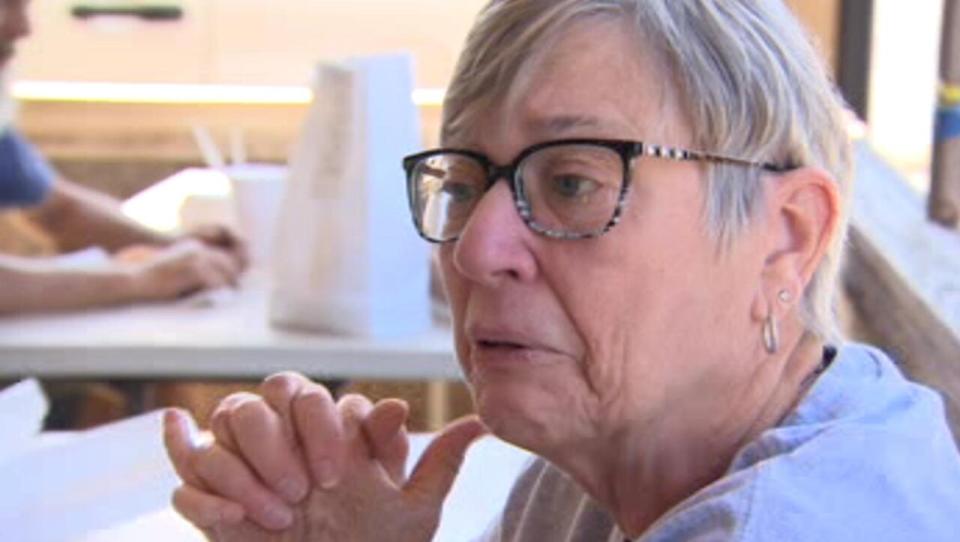

Trump supporter Tina Carr began to weep as she discussed the plight of American citizens. She said the country should care more about them, and less about migrants. (CBC)
She can’t understand why the U.S. allows in so many migrants. And, echoing comments from Trump, why they get public benefits.
It’s true that some migrants are eligible for a small share of public programs — including disability benefits in rare, specific cases (like for human-trafficking victims). That said, migrants often pay into programs but can’t use them.
“We have children … in our community that are hungry. They’re living in cars. They’re living in hotels,” Carr said, weeping. “It’s sad. We’re taking care of everybody else but ourselves. But the Americans. We’re being set aside, and something needs to be done.”
Harris: Feels like 2008
It is exceedingly difficult to predict the result of a close election. Swing voters are often timid in sharing opinions with either pollsters or journalists.
Like a UPS driver in Asheville, a Latin-American 20-something named Jesus.
“Trump’s gonna win,” he said, praising some Trump policies but criticizing his rhetoric about immigrants.
How will he vote? “I’ll decide last-minute,” Jesus said.
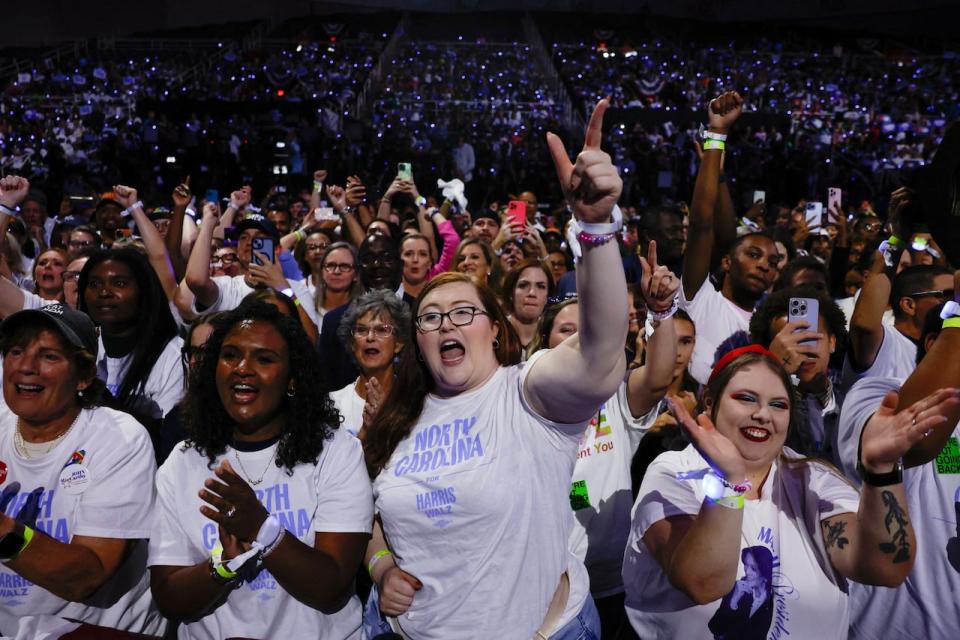

Kamala Harris supporters react during her rally in Charlotte, N.C., on Thursday, her first campaign stop after the televised debate on Tuesday. (Evelyn Hockstein/Reuters)
While door-knocking, Thomas met an elderly white woman. At first, the woman said she was cooking and too busy to talk. But after a moment, she whispered her support, pointing at Thomas’s Harris T-shirt and saying quietly: “I’m with your candidate.”
A CBC reporter asked her if she’s ever voted for Trump. She shot a glance behind her into the house, turned her back to the door, opened her lips and silently mouthed the word “no.”
We were left reading any available tea leaves.
In a lecture room at the University of North Carolina’s Charlotte campus earlier this week, CBC News asked for a show of hands: How many were more enthusiastic about this election with Harris now in it?
The vast majority, maybe 70 per cent, raised a hand. Noticeably, a few of the young men near the front did not. Democrats here are worried about Gen Z men not turning out for them.
The next day, Harris appeared in the city for a big, boisterous rally in a packed auditorium. It was her first after a strong debate against Trump.
Tausha Forney said she hasn’t seen this much excitement in years. Not since rallies she attended in 2008, the last time Democrats won the state, during Barack Obama’s first national run.
“The energy is super,” said the curriculum programmer for non-profit groups outside the event. “It felt powerful. Visceral.”
The Obama comparisons are rampant. Many people, including some merchandise vendors outside — not even Harris fans — liken the energy to 2008.
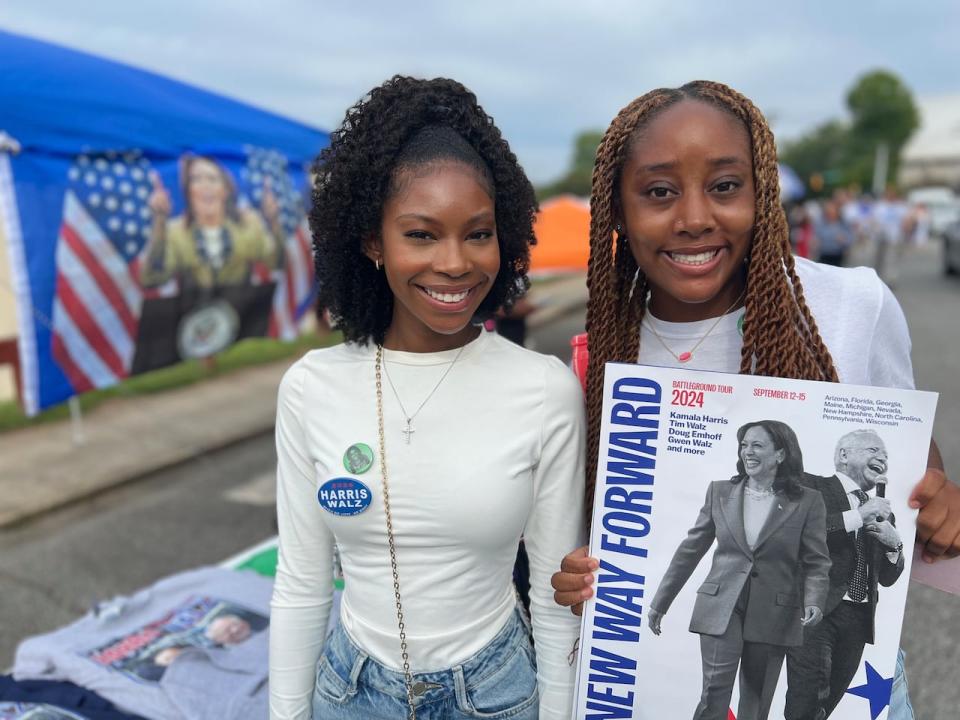

Katelyn Guidry, 20, and Valerie Fynn, 19, friends and fellow students at the University of North Carolina, are seen after attending a Harris rally in Charlotte, N.C., on Thursday. (Alex Panetta/CBC)
So does Aimy Steele. After she lost a close state legislative race four years ago, she started a group aimed at registering Black voters. Citing past stats, she argues that just a small increase in turnout would unleash a tidal shift in election results.
“This time is different,” she said. “It feels different. People are more excited, they’re more engaged.… It’s so refreshing.”
Wife attended Jan. 6, husband a Democrat
Back in Asheville, a Republican candidate describes changes she doesn’t welcome in her boomtown. Kirstie Sluder sees big-city problems growing, like homelessness in the street.
The state legislative candidate bemoans the city councillors who won’t recite the Pledge of Allegiance; easy access to bail, linked to two recent deaths, including a horrific stabbing murder; and sanctuary for undocumented migrants.
“This is not America,” Sluder said.
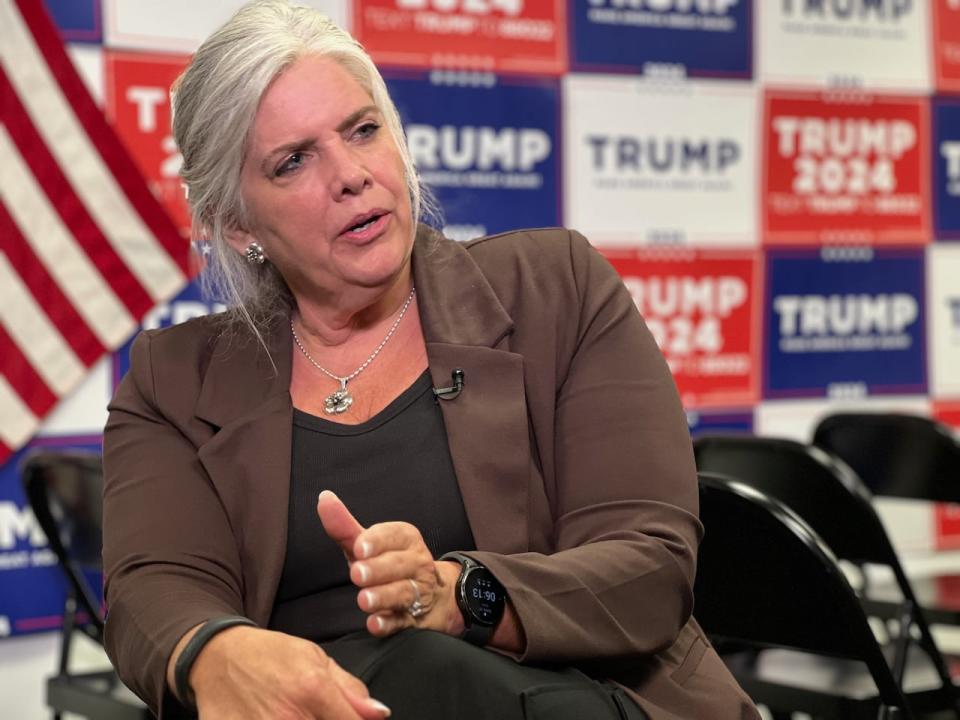

Kirstie Sluder, a Republican candidate for state office, doesn’t like where her city is heading. She is a staunch defender of Donald Trump and was at the Capitol on Jan. 6, 2021 — and she’s married to a Democrat. (Alex Panetta/CBC)
She was at the Capitol on Jan. 6, 2021, protesting Biden’s election win. She’s deeply religious, and quoted scripture several times during an interview. She’s also a onetime Democratic voter and a career social worker. She wants more government spending on family programs.
Her husband, Danny, is still a Democrat. A retired railroad worker, he’s a moderate. Sluder says he supports her run.
Wait — will her husband vote for Harris?
She laughed, then buried her face in her hand. She doesn’t know. She then uttered a heartfelt wish she hoped her beloved husband might heed.
“Please don’t vote for her,” she said, shaking her head in mock disbelief.
It turns out there are families much like this state: split down the middle.
The household, the nation, the world is watching voters like Danny Sluder.

